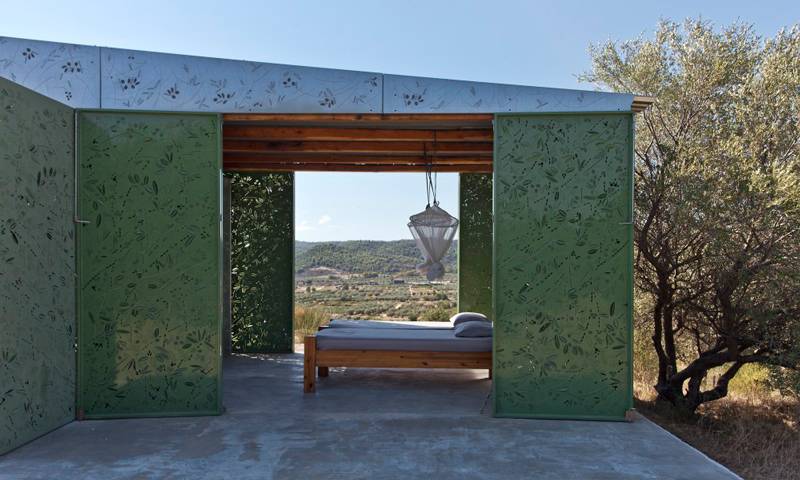Eva Sopeoglou | The Tectonics of Comfort | PhD in Architectural Design thesis

Research
Subject
The Tectonics of Comfort
First and second supervisors
Dr Marjan Colletti | Professor Stephen Gage
Abstract
This practice-based PhD thesis is an enquiry into sustainability and the provision for human comfort in architecture, questioning the definition of inside and outside inhabitable space. My thesis considers thermal comfort from an architectural, aesthetic, and socio-cultural perspective. Architectural envelopment and comfort are here explored as multi-dimensional qualities of inhabitable space, place and the environment.
Following the theories of Gottfried Semper, the research explores building as a form of dressing. Both clothing and building are adaptable environmental modifiers critical in the fabrication of thermal comfort. In addition, shadows emerge as temporal architectural phenomena with textile-like qualities, and the external envelope becomes a soft and modifiable ‘textile’ tectonic material. Semi-outdoor and intermediate spaces can become the places where thermal comfort is generated.
Furthering Semper’s theory of cladding and concept of a textile tectonic, the writings and built projects of Bernard Rudofsky – the avant-garde modernist and advocate of vernacular architecture – help redefine comfort. Rudofsky promoted human comfort in architecture beyond socially accepted norms of the time. For Rudofsky, exemplary spaces were buildings and urban settings with ambiguous external boundaries, such as the patio house, the urban arcade and the Japanese house-garden, all of which relate to ideas of comfort. Furthermore, Rudofsky’s own built work features shadows with soft boundaries and playful textures.
The thesis also draws from original archival research into the Cedric Price Fonds at the Canadian Centre of Architecture (CCA) Montreal, Canada. Price’s work concerns the ephemeral and temporary architectural spaces, and this project involves a careful study of shaded and temporary spaces to provide comfort in a semi-outdoor configuration.
The project Weaving Shadows or ‘The Olive Tree House’ is a built project, a small summer house located in Greece, which forms part of this thesis. The building explored designing with shadows – a topic explored in ancient architectures from across cultures and civilisations. It involved the design and fabrication of a 1:1 prototype enclosure, featuring a permeable and movable metallic envelope, a textile-like patterned surface. As shadows move during the day, the house becomes a nomadic living environment. The project was designed and built using digital CAD/CAM technologies. The tectonic arrangements of semi-enclosed spaces suggest a possible sustainable future for architecture where the boundaries between exterior and interior are negotiable, and thus bodies can freely inhabit the architectural fabric.
The thesis is supervised by Dr. Marjan Colletti and Prof. Stephen Gage. The built component of the thesis, the ‘Summer House in Halkidiki, Greece’ or ‘The Olive Tree House’ has received international acclaim and has been awarded a Surface Design Award (2016, London), a Domes Award (2017, Athens) and an Architizer A+ Award (2017, New York).
Biography
Eva Sopéoglou is a London-based architect whose practice overlaps practice, academic research and university teaching. Her work is concerned with the interaction of people with the environment both within urban and natural contexts.
A recurring theme is the relationship between interior, exterior and semi-enclosed spaces; this is an often-overlooked aspect of space-making which she considers crucial, both in the public and domestic spheres.
Eva pursues a keen interest in materials, craft and fabrication and a creative engagement with technology through cross-disciplinary collaborations with architects, textile designers and metal fabricators. She is a practicing architect in Greece and in the UK and has worked in New York with Bernard Tschumi Architects.
Eva is an experienced and passionate tutor and a regular invited critic in architecture schools across London, the UK and Greece. She is a Lecturer at the University of Hertfordshire’s Architecture programme.
Image: Summer House in Halkidiki, Greece © Mariana Bisti
PhD Close
Close

